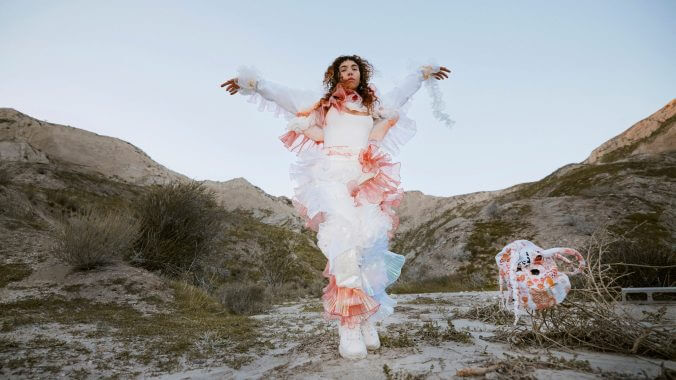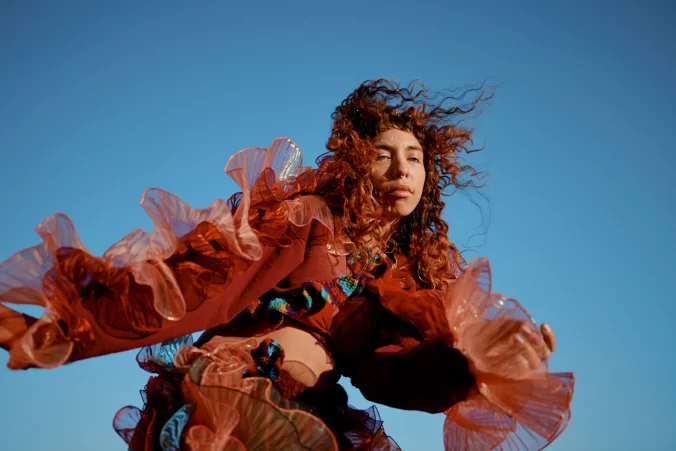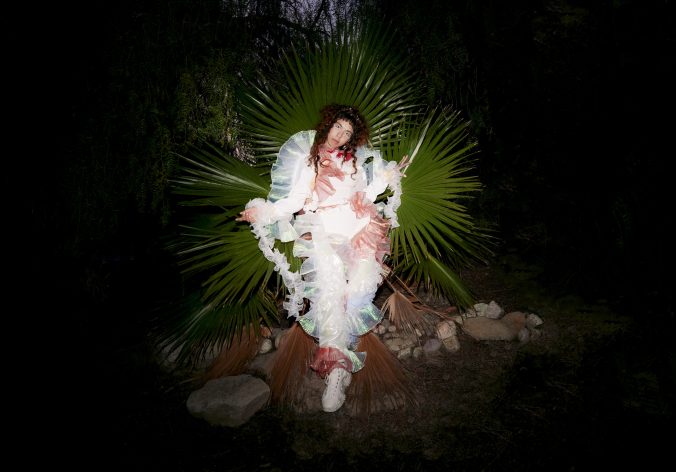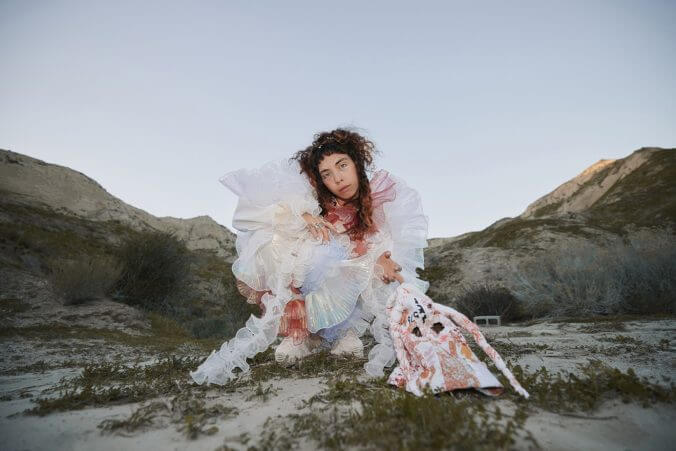On the Doorstep of an Ending, Indigo De Souza is Reborn
The Asheville singer/songwriter talks All of This Will End, her songs becoming stories for other people and the triumphs of creating through joy
Photos by Angella Choe
When Asheville, North Carolina hero Indigo De Souza wrote and released I Love My Mom in 2018, she was only 20 years old and already tracking the aches of alienation. “When am I gonna get out of bed / Like everybody else does, everybody else does? / When am I gonna get a better head / Like everybody else does, everybody else does?” were the first lines of her first album ever. It might have been easy for folks to write those questions off—especially given De Souza’s age—but, unless you were a college kid in the Trump years, the catastrophe of a mundane life’s chaos will nihilistically endure in all of us. I Love My Mom’s chronicling of shortcomings, both romantic and emotional, resembled the headspace of us young adults living in quotidian towns while the immediate world beyond our grasp was folding inwards.
And by the time De Souza’s sophomore album, Any Shape You Take, came out in 2021, I felt like I’d already spent an entire lifetime searching for a musician who built a world that felt similar to my own. I’d found a songwriter who was also on a one-way ticket to the quarter-century mark in life, and the songs she put on Any Shape You Take—like “Hold U,” “Pretty Pictures” and “17”—catered to a very specific type of language I needed: minimal yet honest, thoughtful. De Souza never overdid it, refusing to muddy each song’s language by saying too much. On “Hold U,” it was the warm blanket of “I will hold you” that was enough; on “Way Out,” it was “I’ll be here to love you.” Amid all of the expositions of coming undone, De Souza screamed and lullabied her way through agony and ecstasy; it was a perfect portrait of someone my age sparring with inescapable harmony of fucking up and falling in love. I felt seen, and so did countless others who fell in love with her microcosm of wide-ranging genres and articulations.
After Any Shape You Take was finished, De Souza listened to it in her car while crying through a spell of goosebumps, knowing that the album was perfect the way she made it. But, even though Any Shape You Take was critically revered and beloved by her fans, the post-recording process was brutal for De Souza, who lost her band in the wake of its completion. “It was a really hard time in my life, and I’d made music with people who ended up abandoning me right after we made [Any Shape You Take] and didn’t want to be a part of the process—the journey I was on—anymore,” she says. “I felt really scared and alone, because I had been convinced that those people were the only people for me. I was worried about being able to find people who feel good playing with and would feel good to move forward with. [Any Shape You Take], even though that happened, it feels really special and I’m really glad that I was able to make the album with those people. That was our final moment together.”
The community De Souza had come to love and make music with was now gone. With a tour and the inevitable, eventual cycle of another album on the horizon, she had to isolate the processing of her grief, rediscover the meaning of boundaries and, literally, decide what shape her life would take next. “I morphed out of the entire community that I’d had up until that point and realized that I was in a really unhealthy place and had unhealthy relationships and needed to find a different path,” she adds. “It really was a shedding of a lot of things.”

In the space of her transition after Any Shape You Take, De Souza began writing the songs that would form the skeleton of All of This Will End. She assembled a new band—Alex Farrar, Dexter Webb, Avery Sullivan, Zack Kardon, Dave Hartley, Ryan Oslance, John James Tourville and Alex Bradley—that she trusted, and they all holed up in Drop of Sun Studios in Asheville to bring her next chapter to life in 2022. “I had [made a record] twice; I learned a little bit each time,” De Souza says. “Going into [the studio] this time, I had a lot of the songs already figured out—the way I wanted them to sound—or I had demoed them out and had those references. I had a pretty clear vision for everything.” The people she brought in this time helped her return to a stable, creative space. “I was in a much darker place the last time I made an album, so this one felt a lot lighter. And I felt a lot more supported,” De Souza adds.
All of This Will End was teased two months ago with lead single “Younger & Dumber,” a four-and-a-half-minute seismic shift in De Souza’s career. As soon as it hit streaming services in February, the floodgates of discourse online opened. The talk wasn’t in a negative light. No, instead, folks were calling to the heavens that De Souza had released her greatest track yet. And maybe they were right. Gone were the coats of auto-tuned alt-rock and subtle dance-pop. She had found catharsis through closure.
When I covered the song upon its release, I considered what kind of power-move it was to release the finale of an album first. De Souza had returned to us with this ballad of irreparable heartbreak and geographical disaffection, and it felt like the grandest gesture she could make. “I don’t feel at home in this house anymore / Which way will I run when I’m over you? / I don’t feel at home in this town,” she sings, as Tourville’s pedal steel swells into a brief, full-band mirage of distortion. De Souza—whose influences sprawl from Hole to Arthur Russell—was inspired by Kacey Musgraves when she was producing “Younger & Dumber,” hoping to mimic the country superstar’s glossy-yet-beautiful, rugged style. It was initially going to be a solo guitar song, but, when De Souza discovered the, in her own words, “most beautiful-sounding piano I’ve ever heard” at Drop of Sun Studios, the single’s dynamics contoured into one spell-binding, breathless take.
“Younger & Dumber” wasn’t originally going to be All of This Will End’s lead single. De Souza made the decision to self-direct the music videos for all three teaser tracks she and her team were set to release, and first on the block was “Smog,” an amalgamation of catchy hooks, monotone vocals and an earworm melody that had chart-topping architecture. “In planning the video [for ‘Younger & Dumber’], we were building the set and the costume was coming together and I was planning on taking four grams of mushrooms and dancing through the video,” De Souza says. “It felt like the clearest that a visual vision had ever come true for me, and I was just so excited about it. I had a gut feeling that I needed to lead with that song, because it was the most-personal and most-powerful thing that I could lead with.”
All of This Will End is, sonically, much like Any Shape You Take. It weaves in and out of different genres, textures and approaches, touching everything from grunge-inspired alt-rock to dancefloor pop to folk songs plump with synthesizers. But here more than ever before, De Souza’s tracklist sequencing is an ambitious revolving door, as she pairs two perpendicular songs together far across the album. The heavy, whistling, distorted noise rock of “You Can Be Mean” falls into the slow-burn piano ballad “Losing”; “Wasting Your Time” is one of the heaviest cornerstones of All of This Will End, while “Parking Lot” softens into a glossy indie rock vibrato soon after.
-

-

-

-

-

-

-

-

-

-

-

-

-

-

-

-

-

-

-

-

-

-

-

-

-

-

-

-

-

-

-

-

-

-

-

-

-

-

-

-










































